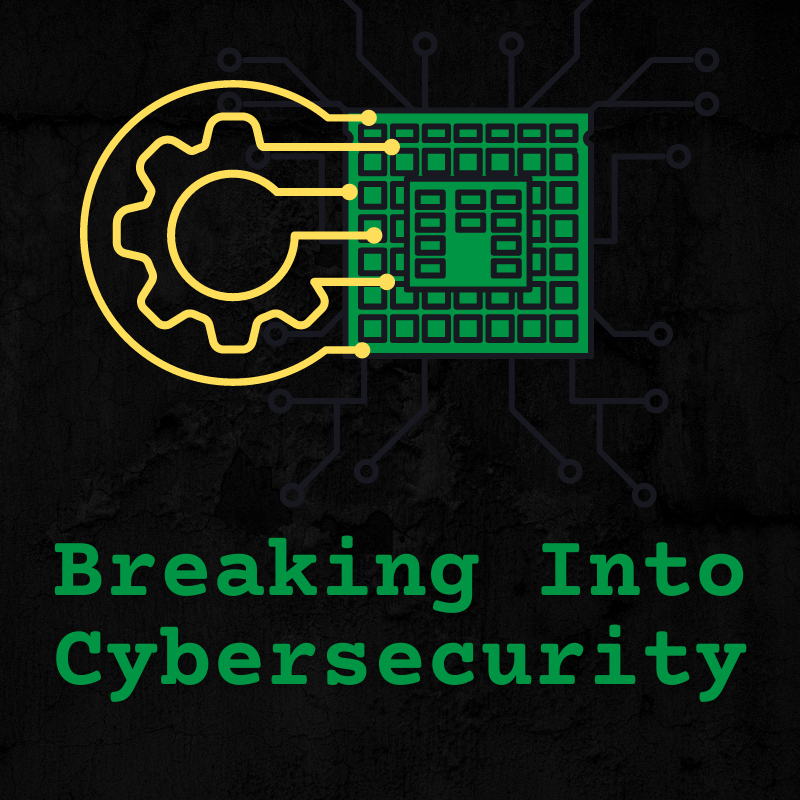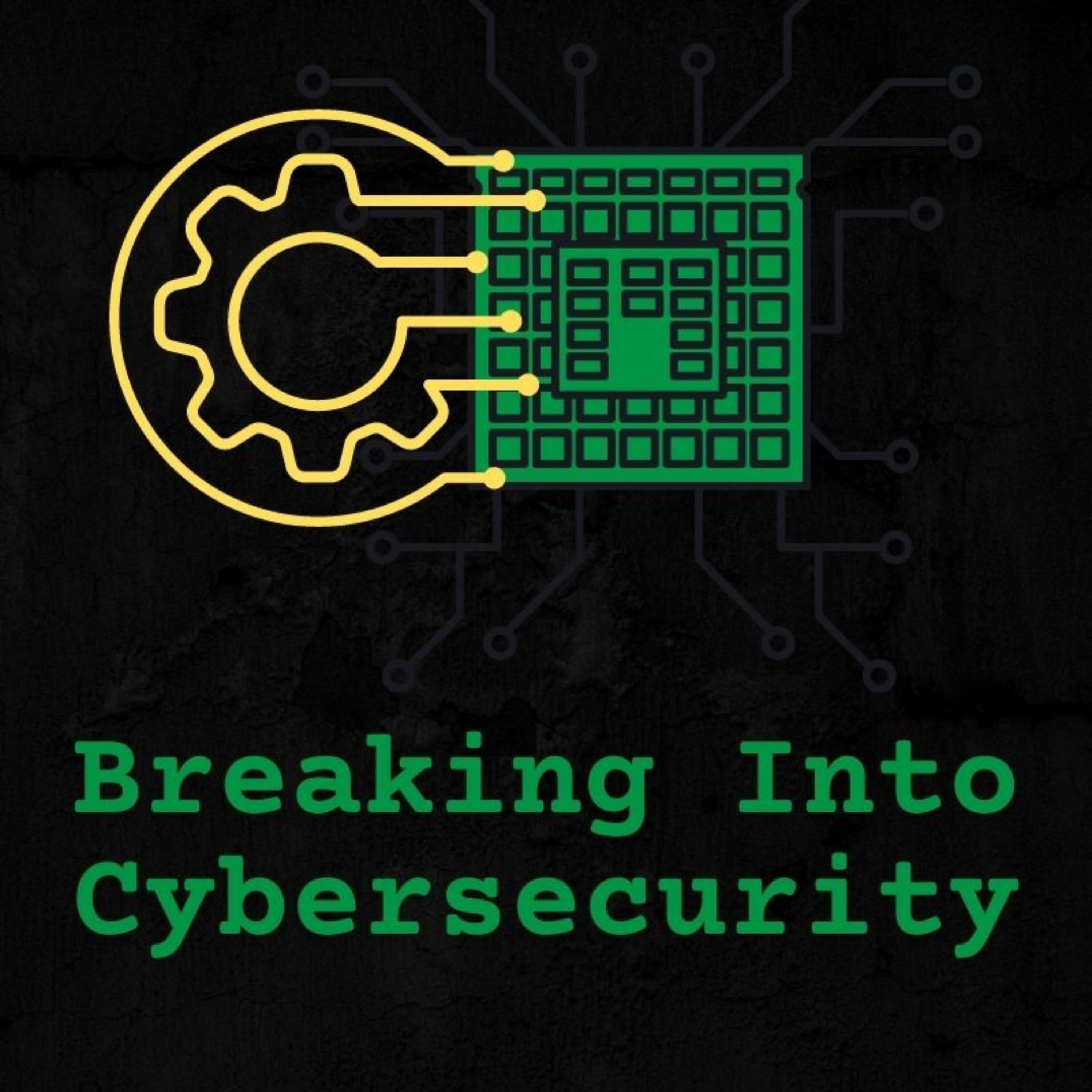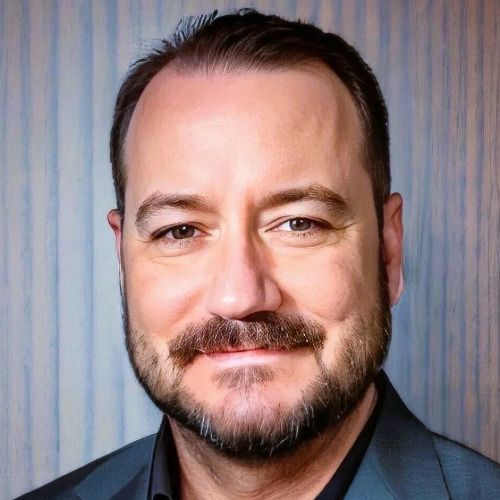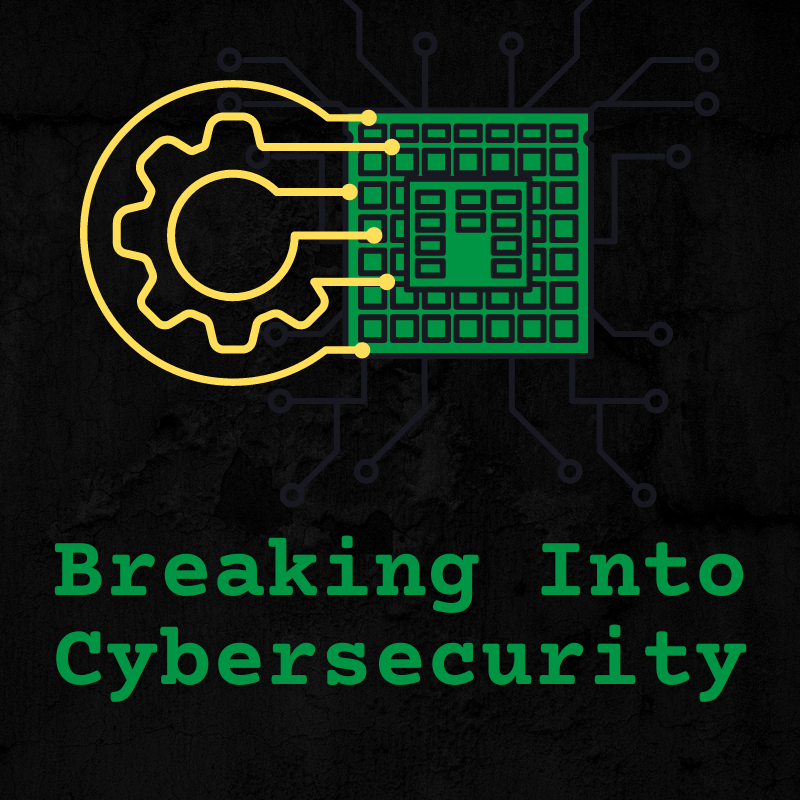full
Breaking into Cybersecurity Leadership - Meghan Gorman
Breaking into Cybersecurity Leadership - Meghan Gorman
Meghan Gorman On LinkedIn https://www.linkedin.com/in/meghan-gorman-a312549/
Sponsored by CPF Coaching LLC - http://cpf-coaching.com
The Breaking into Cybersecurity: It’s a conversation about what they did before, why did they pivot into cyber, what the process was they went through Breaking Into Cybersecurity, how they keep up, and advice/tips/tricks along the way.
The Breaking into Cybersecurity Leadership Series is an additional series focused on cybersecurity leadership and hearing directly from different leaders in cybersecurity (high and low) on what it takes to be a successful leader. We focus on the skills and competencies associated with cybersecurity leadership and tips/tricks/advice from cybersecurity leaders.
#cybersecurity #breakingintocybersecurity #informationsecurity #AdvanceYourCyberCareer
Check out our books:
Develop Your Cybersecurity Career Path: How to Break into Cybersecurity at Any Level: https://amzn.to/3443AUI
Hack the Cybersecurity Interview: A complete interview preparation guide for jumpstarting your cybersecurity career https://www.amazon.com/dp/1801816638/
More Courses and content available here: https://cpfcoaching.gumroad.com
_________________________________________
About the hosts:
Christophe Foulon focuses on helping to secure people and processes with a solid understanding of the technology involved. He has over ten years of experience as an experienced Information Security Manager and Cybersecurity Strategist with a passion for customer service, process improvement, and information security. He has significant experience in optimizing the use of technology while balancing the implications to people, processes, and information security by using a consultative approach.
Christophe Foulon on LinkedIn: https://www.linkedin.com/in/christophefoulon/
Find out more about CPF-Coaching at https://www.cpf-coaching.com
- Website: https://www.cyberhubpodcast.com/breakingintocybersecurity
- Podcast: https://feeds.captivate.fm/breaking-into-cybersecurity/
- YouTube: https://www.youtube.com/c/BreakingIntoCybersecurity
- Linkedin: https://www.linkedin.com/company/breaking-into-cybersecurity/
- Twitter: https://twitter.com/BreakintoCyber
- Twitch: https://www.twitch.tv/breakingintocybersecurity
Mentioned in this episode:
CPF Coaching: Cybersecurity Leadership and Talent Development Consultant
CPF Coaching: Cybersecurity Leadership and Talent Development Consultant
Transcript
Welcome to another episode of Breaking into Cybersecurity
2
:Leadership, where we develop the
cybersecurity leaders of tomorrow.
3
:Today's guest, Megan Gorman,
will be sharing her experience in
4
:cybersecurity sales leadership,
and how she got to where she is.
5
:Before we get there, the whole point
of this show is to share with others
6
:so that we have a diverse perspective
of individuals coming into this field.
7
:Without that, we won't be
able to solve the complex
8
:cybersecurity problems of tomorrow.
9
:So please do share this with
others that are interested in
10
:cybersecurity and sales today.
11
:And let's develop the leaders of tomorrow.
12
:. Megan, would you be able to share some
of your background and what you were
13
:doing before you got into cybersecurity?
14
:Meghan Gorman: Good morning, Chris.
15
:Absolutely.
16
:I had a pretty untraditional
path to cybersecurity.
17
:I started working on Wall Street
straight outta college, and then I
18
:worked I worked in economics for a
couple years doing commercial real
19
:estate applications of that field.
20
:Then I got into technology in general.
21
:Not really specifically
cybersecurity, working with
22
:hardware and software, understanding
networks, the basics of it all.
23
:And and then I got a an opportunity
with specific software that
24
:dealt with SI with security.
25
:So I started to learn more
about cyber in that way.
26
:Then I landed up starting my own
managed security services practice
27
:and ran that for about seven years.
28
:And with that really, had to learn very
quickly services, product, all of the,
29
:all the things, bringing it all together.
30
:I, we offered, virtual.
31
:ciso opportunities to clients, and
it was really a, it was a very steep
32
:learning curve, but it was a way that
I really accelerated my knowledge
33
:and was able to establish myself
as, a sales leader in the industry.
34
:So in, in brief, that is my
background, but it was I was
35
:trained at both the undergraduate
and graduate level in economics.
36
:Definitely not something
that I started out pursuing.
37
:Christophe Foulon: So for those that
are interested in sales but might not so
38
:know cybersecurity or might be interested
in getting into cybersecurity and I.
39
:Might not have a sales background.
40
:How would they learn each of these skills
and competencies based on your experience?
41
:Meghan Gorman: I think a big piece
of it is to, consider jobs that
42
:They may not be exactly what you're
looking for then, they get you closer.
43
:They get you closer to cyber
or to technology in general.
44
:And then there's also, doing
your own your own research kind,
45
:your own investigations, starting
to familiarize yourself with
46
:the various areas of the field.
47
:And then I think, networking is a really
big part of succeeding in this industry.
48
:Just getting to know people.
49
:That are currently in the industry and
learning, all the different paths because
50
:there are so many paths that you can take.
51
:Sales is just one path.
52
:You could do, product, you could product
engineering, you could do you could be on
53
:the services side and, be a Vcso virtual
ciso if that's what you're preparing for.
54
:I, there, there's a lot of ways to go
and, I would advise anybody that, your
55
:first job may, it may not be the perfect
ideal fit, but if it gets you closer if
56
:it's gonna teach you something that you
can build on, if it's a building block,
57
:then you should consider taking that.
58
:And then, take and then having next
steps after that, that you can get
59
:ultimately to where you want to go.
60
:Christophe Foulon: I love the advice
of looking at the industry as a broader
61
:perspective and then narrowing down,
taking building steps to get there.
62
:'cause I think often individuals
try to jump too far and I.
63
:They burn out, trying to catch up and
drink from the fire hose all at once.
64
:Now, as you grow in your career, what are
some of the things that a leader should
65
:know as you're growing into leadership?
66
:Meghan Gorman: A, a couple things.
67
:I think that one, first and foremost
being in this industry you're
68
:telling people a lot of things
that they don't want to hear.
69
:So you know, whether it's, on from
a sales perspective or a leadership
70
:perspective, you're coming in a lot
of times and saying, we we need to
71
:re-engineer what you've done here,
or we've, we need to get rid of some
72
:of the things that you've been doing.
73
:And you're gonna have to change
habits, change hearts, change minds.
74
:And as we know that
that's not an easy task.
75
:So I think be, you have, but you
have to be prepared for that.
76
:It's not you're not always
gonna be glorified so to speak.
77
:You might be thought of a little bit as
the enemy because you are Really trying
78
:to make some major changes and that
may or may not be well received by the
79
:organization that you're in initially.
80
:So you have to, I think you have to
kind, have that thick skin that and the
81
:passion and the belief that this is the
right path for them and that the risks of
82
:not doing anything and the consequences
of not doing anything are too great.
83
:To ignore, so that, that would be
one of my big pieces of advice.
84
:Christophe Foulon: Okay.
85
:And . For you personally, why did you
become a cybersecurity leader versus
86
:staying an individual contributor?
87
:Meghan Gorman: I think it was always a,
dream of mine to have my own company and.
88
:I saw, a niche that was at the time
fairly underserved, and I thought,
89
:if not now when, and, what kind
of, what am I waiting for, right?
90
:There, there's an opportunity
out there in the market.
91
:I see that's real, that I've validated.
92
:I had sold some other investments
that I had, so I was like, I have
93
:some capital to, to start, start this.
94
:And it was always a dream of mine.
95
:And it know I liked it.
96
:It was it was extremely cha
the challenge of it all.
97
:An individual contributor, you're
pretty focused on one thing.
98
:When you do your own business,
you have to wear a lot of hats.
99
:Yeah.
100
:you have to become, an
expert in a lot of areas.
101
:And even though that's
challenging, it's, it's it's fun.
102
:And there, there's really, again,
I think that the opportunities for
103
:learning are really unbounded because,
you're getting approached by a lot of.
104
:A lot of subject matter experts
and people who you know are very
105
:prestigious in the field to work with
you or have a partnership with you
106
:or consult or something like that.
107
:I just I really the, the unbounded
opportunities that the owner being
108
:on, having my own business presented.
109
:Christophe Foulon: And what are,
what do you think the critical skills
110
:for cyber security leader should be?
111
:Meghan Gorman: I think you know, first you
need to have the technical knowledge to.
112
:Maybe not in the, in, in-depth level as
an engineer, but you do need to have a
113
:technical knowledge and definitely be
very familiar with the tools out in the
114
:market and really, what the results are.
115
:What can you expect from these tools?
116
:And then I think a lot of the other
pieces are, compliance is a big piece.
117
:You have to know, different
compliance and regulations get
118
:sets, what it takes to get there.
119
:And obviously which one, one of
those applies to organization.
120
:And then also, to So to bring
that as a goal and or an
121
:objective to your organization.
122
:And also, bring that, I'm
gonna make some waves here.
123
:We're gonna change some habits and
have the, the gravitas to to see
124
:that through to, to the better end.
125
:Christophe Foulon: Now let's talk
about some specific skills, and
126
:I'll ask you for your comfort level
on a scale of one to five, and why
127
:do you think you're so important?
128
:So the first skill is delegation.
129
:I.
130
:, why is, what's your comfort
level with delegation and why
131
:is it such an important skill?
132
:Meghan Gorman: I am, I'm very
comfortable with delegation.
133
:It.
134
:It is important because you simply
can't, there's not enough hours in
135
:the day to do everything yourself.
136
:And in any leadership position, you
have to learn to trust your team,
137
:trust their skills and abilities.
138
:If you don't, then you
shouldn't have hired them.
139
:And also, you're getting a lot of
Of good diversity there because,
140
:you may have somebody who's very
good in a certain area, or even,
141
:potentially stronger in an area that
you're stronger than you in an area.
142
:Giving tasks to them is advantageous for
everybody because that's gonna get done
143
:in a very precise and detailed manner.
144
:And then.
145
:That's going to, elevate the
team and elevate the function.
146
:Yes I think that delegation is extremely
important and yes I'm very comfortable
147
:with it because I've seen the positive
outcomes when it's done right.
148
:Christophe Foulon: And in line with
delegation, there's collaboration.
149
:How would you rate yourself
a scale of one to five?
150
:Why is it such an important.
151
:Skill.
152
:Meghan Gorman: I would say a five.
153
:And I think collaboration, you
bring, everyone brings their own
154
:mindset to the table, based on their
experiences and what you know, what
155
:their particular path was, right?
156
:And when you collaborate with
people, you're getting all of
157
:those experiences together.
158
:Instead of maybe just an engineering
perspective or, just a, hacker
159
:perspective, or former hacker perspective.
160
:So you're able to leverage all of that
knowledge instead of just, maybe one
161
:or two or if you're not collaborating.
162
:So it's really, again, it goes back to
the power of the team and what people
163
:with those different skill sets can all
bring to the table is I think at the end
164
:of the day, a lot more powerful than any
one person can bring to the discussion.
165
:Christophe Foulon: And for
communication, how would you rate
166
:yourself on a scale of one to five,
and why is it such an important skill?
167
:Meghan Gorman: I would read myself a.
168
:I guess four or five on, on communication.
169
:It's an important skill because you,
especially in cyber, because you need
170
:to all know what each other is doing.
171
:And, not only do make deliverables,
but also to, make sure that
172
:you are you're all working.
173
:Towards the same goals, right?
174
:And communication's a key part of that.
175
:If you're not communicating,
you don't know that.
176
:And you know that, that's where
things can really break down.
177
:So I think it's very important
to, to have those open lines of
178
:communication no matter what, between
leadership and team, and really
179
:make sure that those go both ways.
180
:That, it's just not either a top
down, only, there's also you would
181
:a 3 6, 360 degree feedback and
communication that's always going on.
182
:Oh, I would say daily is ideal to
make sure that everybody is on.
183
:On the same sheet of music and
what, what our tasks and what our
184
:priorities are, because those are
obviously constantly changing.
185
:It's a con, it's a very
fast evolving industry.
186
:You could come in and think your
day's gonna go one way, and then
187
:something happens unexpectedly, and
then, you need to completely pivot.
188
:And the only way to do that successfully
is to be able to communicate
189
:effectively with everyone around you.
190
:Christophe Foulon: How important would you
consider the skill of influence and why?
191
:Meghan Gorman: I think
influence is very important.
192
:I think it goes back to what I said
earlier about the job of leadership.
193
:It, cyber is really a lot of, you
know that you're Your charge is to
194
:change, habits and mindsets, and
those are very difficult things to do.
195
:So I, I think that you to position
yourself as an influencer and learn to
196
:influence and persuade is a key part
because that you're gonna spend a lot
197
:of your time initially doing that.
198
:Because, as humans, we don't.
199
:Really like change, relate
things to be the way they were.
200
:And you're taking on a task
that's, that, that's difficult.
201
:So I think that that ability to be
an influencer is critical to your
202
:success because that's really,
I would say one of the top five
203
:most important things in your job.
204
:Is to be able to influence
people's mindsets and their,
205
:and change their habits.
206
:Christophe Foulon: How important would you
consider networking as a skill and why?
207
:Meghan Gorman: I think networking
is a really, a very necessary skill.
208
:And I think it comes from, you it's
helpful if you do have A passion,
209
:like something, an aspect of the field
that you are very passionate about.
210
:Whether it's privacy, whether it's, you
protecting data, that you just don't, you,
211
:you just feel very personally, violated
when these, breaches and things happen.
212
:And I think that, if you bring that to,
networking and find other, like-minded
213
:people and groups and there's so many out
there, focusing on very specif specific
214
:niches in cyber you can grow that and then
eventually, I think leverage that down
215
:the road not only for your own Ification
and learning, but also as valuable
216
:contacts for when, you're going out there
to look for a position or, a consulting
217
:opportunity or something like that.
218
:Because this field is very I
would say networking friend of a
219
:friend oriented, and it really is
about building that community of.
220
:Of not only the champions, but also
people that you can learn from and
221
:people that you could help them.
222
:They can help you.
223
:And I think that's the one of the key
values of networking in this industry.
224
:Christophe Foulon: What final advice would
you give to future cybersecurity leaders?
225
:Meghan Gorman: I, I would give the
advice of, be, to be flexible to be
226
:the, I guess tough, but fair, but fair
and have, when I say tough, having that
227
:don't take everything personally, that.
228
:People may say, because what you're
representing sometimes isn't something it
229
:may not be something particularly welcome.
230
:Again, depending on the organization that
you're at, if how mature they are and how
231
:they been breached, have they not been
breached, those are, those events change.
232
:Change an organization.
233
:Significantly and therefore the reception
of you coming in as as a leader.
234
:So I think it's important to, be
prepared for what kind of organization
235
:you're getting involved with and
then you know what their in the
236
:reception will be for you initially.
237
:But that's likely gonna change because
there's likely gonna unfortunately, be
238
:something that may, that's gonna happen.
239
:That will change their mind about you
and what you represent, but it may not be
240
:something that's present out of the gate.
241
:So I think, just have a thick skin
and be ready to call on all the skills
242
:that you have, in your tool set.
243
:Collaboration, communication
technical skills networking all
244
:those things that we discussed.
245
:Christophe Foulon: Wow.
246
:Megan, thank you so much for coming on to
breaking into Cybersecurity leadership.
247
:We really appreciate your advice.
248
:Love hearing about your
background, and thank you for
249
:taking the time outta your day.
250
:Meghan Gorman: Thank
you, Chris for having me.
251
:It was a pleasure.
252
:Thank you.





